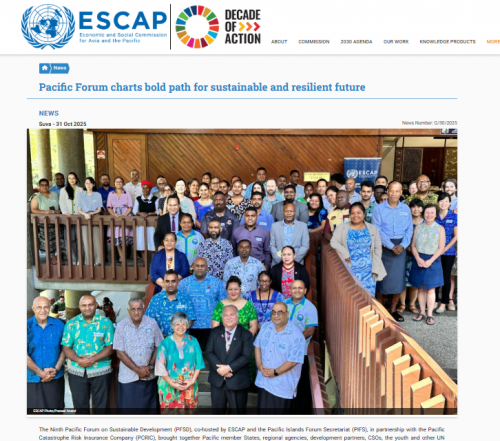
https://www.unescap.org/news/pacific-forum-charts-bold-path-sustainable-...
The two-day Forum reviewed progress on SDGs 6, 7, 9, 11 and 17, highlighting both achievements and challenges. On water and sanitation (Goal 6), delegates noted persistent rural-urban disparities and the need for climate-resilient water systems. For energy (Goal 7), discussions centered on scaling up renewable investments and expanding access through public–private partnerships. The industry and innovation (Goal 9) session underscored the need for regional solutions to infrastructure gaps, digital inclusion and small-business financing, while sustainable cities (Goal 11) emphasized urban resilience grounded in indigenous knowledge and cultural heritage.
The PFSD also spotlighted youth leadership under Goal 17, with young advocates from the Pacific urging governments and partners to treat youth, not just as beneficiaries, but as co-creators of solutions.
Coinciding with the Forum, ESCAP presented its flagship Economic and Social Survey of Asia and the Pacific 2025, which calls for greener, more inclusive growth and climate-smart macroeconomic policies. The Survey stresses the need for productivity enhancement, regional green value chains, and deeper understanding of the “macroeconomic-climate nexus” to safeguard Pacific prosperity.
Two thematic workshops added depth to the discussions: one on Voluntary National Reviews (VNRs) and Voluntary Local Reviews (VLRs), which examined ways to strengthen national and local SDG reporting and coordination, and another on Catalysing Financing for Development, which explored innovative financing mechanisms, private sector engagement and debt transparency as tools for sustainable growth in the Pacific.
Country interventions and other stakeholders showcased national efforts in the SDGs under discussion, with linkages to climate resilience, while partners such as the PCRIC presented practical tools for managing disaster and climate risks in the Pacific.
The PFSD concluded with a clear message: achieving the 2030 Agenda in the Pacific requires transformative, equitable, and coordinated action anchored in partnerships, innovation and local ownership.









